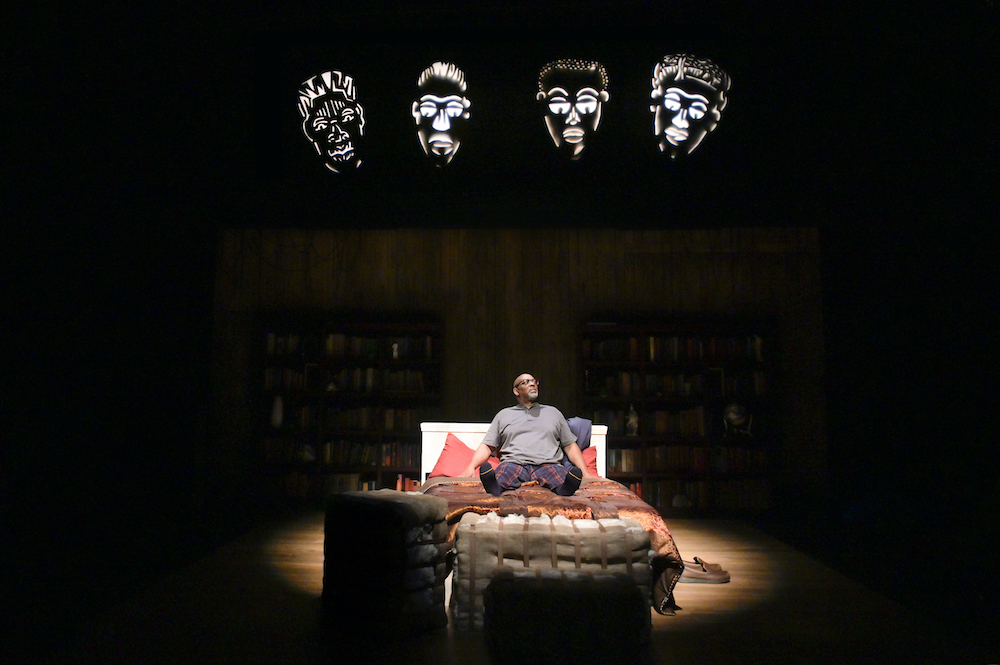I can assure you, dear reader, that it wasn’t my intention to see back-to-back meta-theatrical shows about the lingering effects of Black trauma (both historical and familial). If someone had told me I would be, I’d have put a week or so between the productions to process them separately. Nevertheless, I saw this show one night after seeing A Strange Loop at ACT. I’m pleased to say that this show acts as a welcome antidote to the one at the Toni Rembe Theater.
Blue Door (through May 19 at Aurora Theatre, Berkeley) is an exercise in painting a grand image on a small canvas. It has only two actors—one of whom plays three different characters—who relay a series of anecdotes to document both the shared history of their family and the history of Blacks in America. It’s a story about characters who have only rudimentary understanding of the watershed events happening around them, but their personal dramas figure into those events in ways the characters don’t even realize. What’s more, it emphasizes the single most important part about cycles of abuse: they can—and always should—be broken.
Our story begins in 1995. Tenured Ivy League math professor Louis (Michael J. Asberry), a middle-aged Black man, finds himself in the curious position of having his white wife divorce him because he won’t attend the Million Man March. Mind you, that’s not the only reason, but it proves to be the straw that breaks the camel’s back. It’s the latest example of Louis denying something about himself and about his relationships with others.

His past issues manifest themselves in the form of his ancestors (James Mercer II): plantation slave Simon, his son Jesse, and Louis’ late Afrocentric brother Rex. Like Louis, all of them fought an uphill battle against white supremacy. The difference being that, unlike Louis, they never surrendered. Louis learned to survive in white academia by holding his tongue at cocktail parties where a face as dark as his is only seen serving hors-d’œuvres and drinks (something mentioned explicitly after his father attends one).
Louis’ urge to not make waves has fully calcified into a Black self-hatred so obvious that even his white wife picks up on it. But when you come from a long line of unbeknownst innovators who all wound up as unsung martyrs, it’s understandable why one would be reluctant to stand out in a crowd—even when your complexion makes you do just that.
Playwright Tanya Barfield’s script is a welcome change from most portrayals of Black self-hatred in that she shows how casual it is. Even in a play that is at least 80% soliloquies, Louis isn’t someone who outwardly declares a disdain for his people—as one would find in many-a-poorly-written script—but someone so used to anti-Blackness being the status quo that, like Simon the slave, he simply doesn’t know of a world without it. Louis is exemplary of how establishment Black folks like Clarence Thomas and Oprah can act against their people’s own interest with the greatest of ease, yet fall back on the excuse that being the first Black person in their position absolves them from accusations of selling out.
A gripping scene in the middle of the play has Louis re-enact a time he lashed out at a Black student (who, admittedly, was being disruptive) with the sort of racist vitriol one would expect from someone working on Fox News. Louis believes the myth about “pulling up by the bootstraps,” so he feels it’s his duty to chastise any other Black folks who “make it bad for the rest of us”. Not only does Barfield contrast that with the lives of Rex and Jesse, who wanted nothing more than to live without being murdered by the Klan, but a stroke of genius occurs in a heartbreaking scene where spanking is presented as the abuse it has always been. It’s presented as the slave master’s whip in the hand of the slave himself—how much more pronounced can self-hatred be?

In the role of Louis, under the direction of Darryl V. Jones, Michael J. Asberry gives one of his best performances. He captures Louis’ pompousness just as much as his pain. He isn’t a cypher, but, like all of us, the product of both a nature and nurture put into play before he was even born. The heart with which Asberry injects the character is enough to both believe he can change and to hope deep down that he actually will. Equally compelling is Mercer, who easily distinguishes between his three roles, even as both he and Louis find themselves frequently acting out the personae of random characters the meet, be they slavers or strangers. Watching Mercer’s characters from slave Simon to activist Rex, one is reminded of that 2Pac parable about how Black folks asking for basic needs eventually becomes radicalized action.
In fact, the one thing truly working against Mercer is the god-awful wig he’s forced to wear. As one admires the rest of the play’s technical features—particularly the cabin-esque set by Hector Zavala with its page-covered furniture—the wig is a stunning misfire. Fortunately, it doesn’t sink the show, but it’s enough of a faux pas to make one tilt their head and wonder who the hell approved that damn thing?
Aurora recently sent out a survey about their (already-diminished) COVID safety measures, suggesting that they’re planning to do away with them altogether. They currently require masks on Wednesdays and Sundays, and Blue Door will have streaming performances starting May 14. Still, should the theatre pull off its emergency fundraiser, one wouldn’t be surprised to find all COVID measures gone. In any case, opening night saw about 1/3 or more of us masked, with my Aranet4’s CO² readings topping 1897ppm by the end of the show.
Again, one can debate the fairness of comparing this show to A Strange Loop, but this one possesses both a heart and focus lacking in the other show. What’s more this one doesn’t fall back on gross shock value to exploit trauma for titillation. The opening night house for Blue Door wasn’t exactly full, but one hopes the subsequent audiences will be abundant—both for the future of the Aurora and to give a wonderful story about Blackness the wide reach it deserves.
BLUE DOOR runs through May 19 at the Aurora Theatre, Berkeley. Tickets and further info here.





